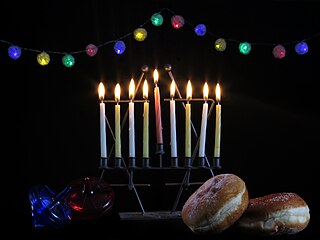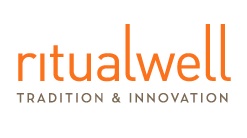
Hanukkah is a Jewish festival commemorating the recovery of Jerusalem and subsequent rededication of the Second Temple at the beginning of the Maccabean Revolt against the Seleucid Empire in the 2nd century BCE.

Judaism is an Abrahamic monotheistic ethnic religion that comprises the collective spiritual, cultural, and legal traditions of the Jewish people. Judaism evolved from Yahwism, an ancient Semitic religion of the late Bronze Age to early Iron Age, likely around the 6th/5th century BCE. Along with Samaritanism, to which it is closely related, Judaism is one of the two oldest Abrahamic religions.

The Mishnah or the Mishna is the first major written collection of the Jewish oral traditions that are known as the Oral Torah. It is also the first major work of rabbinic literature, with the oldest surviving material dating to the 6th to 7th centuries BCE.

Judaism does not centralize authority in any single individual or group. The formulation of principles of faith that are universally recognized by all branches of Judaism remains undefined. There is no central authority in Judaism in existence today - although the Sanhedrin, the supreme Jewish religious court, would fulfill this role if it were re-established. Instead, Judaism's principles of faith remains debated by the rabbis based on their understanding of the sacred writings, laws, and traditions, which collectively shape its theological and ethical framework. The most accepted version in extent is the opinion of Maimonides.

The omer offering, or the sheaf offering, was an offering (korban) made by the Jewish priests in the Temple in Jerusalem. The offering consisted of one omer of freshly harvested grain, and was waved in the Temple. It was offered on Passover, and signaled the beginning of the 49-day counting of the Omer, as well as permission to consume chadash.
ArtScroll is an imprint of translations, books and commentaries from an Orthodox Jewish perspective published by Mesorah Publications, Ltd., a publishing company based in Rahway, New Jersey. Rabbi Nosson Scherman is the general editor.

Chabad, also known as Lubavitch, Habad and Chabad-Lubavitch, is an Orthodox Jewish originating from Eastern Europe. Hasidic dynasty. Chabad is one of the world's best-known Hasidic movements. It is one of the largest Hasidic groups as well as one of the largest Jewish religious organizations in the world. Unlike most Haredi groups, which are self-segregating, Chabad mainly operates in the wider world and it caters to secularized Jews.
Rabbi Ephraim Buchwald is one of the leaders in the movement of Orthodox Jewish outreach in America today.

The New Jewish Publication Society of America Tanakh (NJPS), first published in complete form in 1985, is a modern Jewish 'written from scratch' translation of the Masoretic Text of the Hebrew Bible into English. It is based on revised editions of earlier publications of subdivisions of the Tanakh such as the Torah and Five Megillot which were originally published from 1969 to 1982. It is unrelated to the original JPS Tanakh translation, which was based on the Revised Version and American Standard Version but emended to more strictly follow the Masoretic Text, beyond both translations being published by the Jewish Publication Society of America.

Bradley Shavit Artson is an American rabbi, author and speaker. He holds the Abner and Roslyn Goldstine Dean's Chair of the Ziegler School of Rabbinic Studies at the American Jewish University in Los Angeles, California, where he is also Vice-President. He supervises the Louis and Judith Miller Introduction to Judaism Program and provides educational and religious oversight for two Camp Ramah campuses, Ojai and Monterey Bay. He is Dean of the Zacharias Frankel College at the University of Potsdam in Germany, ordaining Conservative/Masorti rabbis for Europe.
Jewish commentaries on the Bible are biblical commentaries of the Hebrew Bible from a Jewish perspective. Translations into Aramaic and English, and some universally accepted Jewish commentaries with notes on their method of approach and also some modern translations into English with notes are listed.
Joel Blumenthal Wolowelsky is a Modern Orthodox thinker and author. He is the dean of faculty at the Yeshivah of Flatbush high school, where he teaches Ethics and mathematics. He has written extensively on topics pertaining to the role of women in Judaism and Jewish medical ethics. He served as Associate Editor of Tradition, the Journal of Jewish Thought, and The Young One, published by the Rabbinical Council of America, the Tora u-Madda Journal published by Yeshiva University, and MeOtzer HoRav: Selected Writings of Rabbi Joseph B. Soloveitchik.

Jewish outreach is a term sometimes used to translate the Hebrew word kiruv or keruv. Normative Judaism forbids seeking converts to Judaism from other religions, although all denominations do accept those who follow through their conversion with a sincere commitment. Outreach efforts are instead directed at Jews who have "gone astray", or who have been born Jewish in a non-observant family.

Jewish ceremonial art is objects used by Jews for ritual purposes. Because enhancing a mitzvah by performing it with an especially beautiful object is considered a praiseworthy way of honoring God's commandments, Judaism has a long tradition of commissioning ritual objects from craftsmen and artists.
The following outline is provided as an overview of and topical guide to Judaism:
Rebecca Dubowe is the first deaf woman to be ordained as a rabbi in the United States.
Over the course of Jewish history, different attitudes have been held towards poverty and wealth. Unlike Christianity, in which some strands have viewed poverty as virtuous and desirable, Jews have generally viewed poverty negatively. Jacobs and Greer assert, "In general, Jewish texts have portrayed poverty as an unjustifiable burden". In contrast to the consistently negative view of poverty, Kravitz and Olitzky describe a rapidly changing attitude towards acceptance of wealth as desirable as the Hebrews transitioned from being nomadic shepherds to farmers, then ultimately to city dwellers.

Machar, officially Machar, The Washington Congregation For Secular Humanistic Judaism, is a Humanistic Jewish congregation located in the metro area of Washington, D.C., in the United States. Affiliated with the Society for Humanistic Judaism, the non-theistic congregation was founded in 1977, and celebrates Jewish culture, education and celebrations. The congregation has a Jewish cultural school, social action committee, and regular newsletter, and welcomes interfaith couples.

Ritualwell is a website that allows users to find, create and share Jewish rituals. It was initially launched in 2001 and was nominated for a Webby Award in the Religion & Spirituality category in 2003. The site was redesigned and relaunched in 2005. It seeks to "increase the number of rituals available for holidays, Shabbat and traditional lifecycle events.
L'Shana Haba'ah B'Yerushalayim, lit. "to a year to come in Jerusalem" but most often rendered "Next year in Jerusalem", is a phrase that is often sung at the end of the Passover Seder and at the end of the Ne'ila service on Yom Kippur. Its use during Passover was first recorded by Isaac Tyrnau in his 15th century CE book cataloging the accepted tradition (minhaggim) of various Ashkenazi communities.











